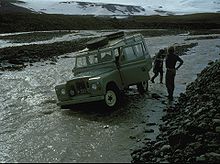| Revision as of 21:04, 22 February 2023 editLockesdonkey (talk | contribs)Extended confirmed users17,164 edits →Interior routes← Previous edit | Revision as of 10:03, 5 March 2023 edit undoEmstrur (talk | contribs)281 editsNo edit summaryNext edit → | ||
| Line 1: | Line 1: | ||
| {{For|the novel by Steinar Bragi|Hálendið (novel)}} | |||
| ] | ] | ||
| ] dominates the central highlands, through which the ] road winds its way]] | ] dominates the central highlands, through which the ] road winds its way]] | ||
| The ''' Highlands of Iceland''' ({{lang-is|hálendið}} {{IPA-is|ˈhauːˌlɛntɪθ|}}) are a sparsely inhabited plateau that covers most of the interior of ]. They are situated above 400–500 meters (1300–1600 feet) and are mostly uninhabitable ], because the water precipitates as rain or snow infiltrate so quickly into the ground that it is unavailable for plant growth. {{Citation needed|date=January 2021}} This results largely in a surface of grey, black or brown earth, ], and ]es. A few ]-like areas, such as ] near ], are found only in proximity to rivers. | The ''' Highlands of Iceland''' ({{lang-is|hálendið}} {{IPA-is|ˈhauːˌlɛntɪθ|}}) are a sparsely inhabited plateau that covers most of the interior of ]. They are situated above 400–500 meters (1300–1600 feet) and are mostly uninhabitable ], because the water precipitates as rain or snow infiltrate so quickly into the ground that it is unavailable for plant growth. {{Citation needed|date=January 2021}} This results largely in a surface of grey, black or brown earth, ], and ]es. A few ]-like areas, such as ] near ], are found only in proximity to rivers. | ||
Revision as of 10:03, 5 March 2023


The Highlands of Iceland (Template:Lang-is [ˈhauːˌlɛntɪθ]) are a sparsely inhabited plateau that covers most of the interior of Iceland. They are situated above 400–500 meters (1300–1600 feet) and are mostly uninhabitable volcanic desert, because the water precipitates as rain or snow infiltrate so quickly into the ground that it is unavailable for plant growth. This results largely in a surface of grey, black or brown earth, lava, and volcanic ashes. A few oasis-like areas, such as Herðubreiðarlindir near Askja, are found only in proximity to rivers.
Icelanders categorize the Highlands as:
- "Háls", meaning a broad mountain ridge between valleys, such as the one near Langavatn north of Borgarnes; or
- "Heiði", meaning the real highlands, such as those alongside the Sprengisandur road.
Most of the numerous glaciers, such as Vatnajökull, Langjökull and Hofsjökull, are also part of the Icelandic Highlands. Vegetation is only found on the shores of the glacier rivers. There is also the danger of glacial outburst floods, or "glacier runs".
Some of the most interesting parts of Iceland with volcanic activity are to be found in the Highlands, such as Landmannalaugar and the region around Askja and Herðubreið.
Interior routes

The Highlands can be crossed only during the Icelandic summer. For the rest of the year the highland roads are closed. The best known highland roads are Kaldidalur, Kjölur and Sprengisandur. Most highland roads require four-wheel drive vehicles, because it is necessary to cross rivers. However, the Kjölur route can easily be traversed in an ordinary car and is therefore one of the more popular highland roads. Off-road driving is forbidden entirely in Iceland where there is no snow, including the Highlands, to protect the environment.
See also
References
- "Mountain Roads" (PDF). Environment Agency of Iceland. 2014. Archived from the original (PDF) on 21 April 2015. Retrieved 26 February 2012.
External links
![]() Media related to Highland of Iceland at Wikimedia Commons
Media related to Highland of Iceland at Wikimedia Commons
| Routes through the interior highlands of Iceland | ||
|---|---|---|
|  | |
| Iceland articles | |||||||
|---|---|---|---|---|---|---|---|
| History |
|  | |||||
| Geography |
| ||||||
| Politics | |||||||
| Economy | |||||||
| Society |
| ||||||